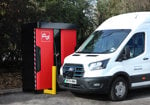The four-year BEST (BioEthanol for Sustainable Transport) project, partly-funded by the European Union, in which manufacturers, towns, bioethanol producers and four universities have joined forces to accelerate the introduction of bioethanol as an alternative fuel in Europe.
The city of Stockholm is acting as co-ordinator for starting up initiatives and Saab Automobile and Ford of Europe will provide the project with test cars and technical expertise.
BEST was launched in Stockholm last month at a three-day conference for all participating organisations.
The first phase of the project calls for the creation of a functioning infrastructure with at least 140 bioethanol pumps at 10 selected sites, including eight European cities. It is hoped that this will lead to nearly 10,000 bioethanol-powered cars being put on the road as demonstrators.
Knut Simonsson, vice-president global marketing and sales at Saab Automobile, which makes a bioethanol 9-5 (pictured), said: ‘It is tremendously exciting to be able to drive developments to reduce carbon dioxide emissions through using such a renewable fuel for road transport.’
Bioethanol fuel is produced commercially from agricultural crops. Unlike petrol, its consumption does not raise atmospheric levels of CO2 because emissions released during driving are balanced by the amount of CO2 removed from the atmosphere through the natural photosynthesis process when crops for conversion are grown.















Login to comment
Comments
No comments have been made yet.